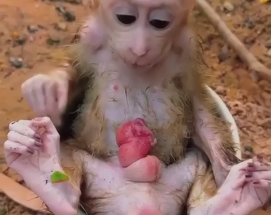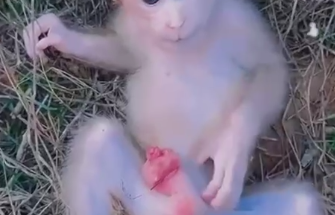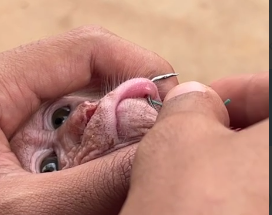A Mother’s Love in Disguise: The Starving Baby Monkey Who Found Hope in a Puppy
In the dense corners of rural India, where the boundaries between wild and domestic life often blur, an extraordinary event unfolded that captured the hearts of many. A frail, newborn baby monkey—no bigger than a human hand—was found clinging to life, abandoned and starving. Its tiny body trembled with weakness, and its cries, though faint, echoed with desperation. What happened next was nothing short of a miracle—a heartwarming testament to nature’s most unexpected alliances and the universal need for compassion.
A Harsh Beginning
The monkey’s story began in tragedy. Whether its mother was killed, separated, or rejected the baby due to illness or deformity, no one could say for sure. The infant, barely days old, was discovered on the outskirts of a village near a forested area. Locals reported hearing the soft cries of a baby monkey for a day or two before finally locating it near a heap of dry leaves under a tree.
By then, the monkey was severely dehydrated and showing signs of starvation. Its eyes, still unopened, twitched from exhaustion, and its body was visibly gaunt. Its survival looked unlikely.
A compassionate villager, Ramesh, took it upon himself to try to save the little creature. He gently wrapped the monkey in a soft cloth and brought it home. Though he had no experience caring for wild animals, his heart wouldn’t let him walk away.
The Unlikely Guardian
Ramesh’s home was a modest one, shared with his family and a handful of animals, including a young female dog named Rani who had recently given birth to a litter of puppies. She was a gentle soul—protective of her young but unusually calm around strangers. Sensing the urgency of the moment, Ramesh placed the monkey near Rani, unsure of what might happen next.
To everyone’s surprise, Rani sniffed the trembling creature curiously and gave it a few gentle licks, much like she would to her own pups. Then something astonishing occurred—the starving monkey instinctively latched onto one of Rani’s nipples and began to suckle.
At first, the dog seemed confused, but not aggressive. She simply lay back, allowing the monkey to feed. From that moment, a new bond was born—one not written by nature, but nurtured by need.
Surviving on Hope
The coming days were filled with anxious hope. The monkey continued nursing from Rani, who treated the orphan as one of her own. Though she had a litter to care for, she never rejected the tiny intruder. Instead, she often curled around it as she did her own puppies, offering warmth, safety, and nourishment.
Ramesh and his family made sure the monkey remained clean and provided supplemental care, including warm water, a safe sleeping area, and medical attention. Slowly, the monkey began to recover. Its strength returned day by day, and soon its eyes opened for the first time.
It was a delicate balance—relying on a domestic animal to nurse a wild one—but it worked. The monkey’s grip strengthened. Its cries turned from weak squeaks to stronger vocalizations. It began to show curiosity about its surroundings, mimicking the movements of its canine siblings.
A Strange but Beautiful Family
The sight of a monkey nursing alongside puppies was surreal. Neighbors and villagers would come by just to witness it. At first, some doubted the story, thinking it must have been staged or altered. But once they saw the tender bond between the dog and the baby monkey, skepticism gave way to awe.
The monkey began to play with the puppies, crawling over them and trying to imitate their behavior. It even began mimicking Rani—following her movements, nuzzling up to her, and sometimes riding on her back as she moved around the courtyard. Rani, incredibly patient and affectionate, allowed it all.
Veterinarians who visited the home were amazed. While cases of interspecies adoption exist in the animal kingdom, they are rare and even more unusual between such different species. Yet, here was a young dog, no more than two years old herself, taking on the role of mother to a monkey with no hesitation.
A Lesson in Compassion
As the weeks turned into months, the baby monkey grew stronger, more independent, and visibly healthier. Though still small for its age, it showed remarkable resilience. Ramesh named it “Chiku,” meaning tiny or little one.
Eventually, as Chiku matured, efforts were made to transition him into a wildlife rescue center where he could safely integrate with his own kind and be prepared for a possible return to the wild. The separation was difficult—especially for Rani, who searched for Chiku for several days after he was taken. But the village knew it was for the best.
The story of Rani and Chiku spread beyond the village, eventually gaining attention on social media and local news. Photos and videos of the monkey nursing from the dog, playing with the puppies, and clinging lovingly to Rani were shared thousands of times. People across the world were moved by the tale—some to tears.
It became a symbol of hope, a reminder that compassion knows no species. That even in the harshest circumstances, love and instinct can transcend boundaries that we once thought were unbreakable.
A Deeper Message
Chiku’s story isn’t just a viral sensation—it’s a profound reflection of the world we live in. In an age where division, cruelty, and neglect often dominate headlines, the bond between a starving baby monkey and a nursing dog offers a refreshing glimpse into a different kind of world. One where empathy rules over fear, and kindness is instinctual.
For the people of the village, Chiku and Rani are more than just animals. They are symbols of unity, survival, and the enduring power of love.
And so, the image of a poor newborn monkey, once moments from death, suckling from a mother who wasn’t his by birth but became one by heart, remains etched in memory—a living parable that sometimes, family is chosen not by blood, but by the purest form of care.


